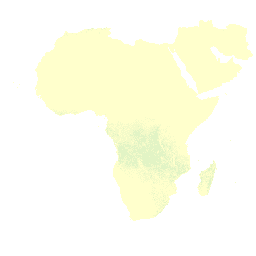
- 데이터 세트 사용 가능 기간
- 2009-01-01T00:00:00Z–2023-03-01T00:00:00Z
- 데이터 세트 제공업체
- FAO UN
- Cadence
- 10일
- 태그
설명
차단 (I) 데이터 구성요소 (10일 단위, mm/일)는 식물 덮개에서 차단된 강수의 증발을 나타냅니다. 차단은 빗물이 잎에 포착되는 과정입니다. 포착된 빗물의 일부는 다시 증발합니다. 각 픽셀의 값은 해당 10일 동안의 평균 일일 증발 차단량을 나타냅니다.
대역
Pixel Size
248.2 meters
대역
| 이름 | 단위 | 확장 | 픽셀 크기 | 설명 |
|---|---|---|---|---|
L1_I_D |
mm | 0.1 | 미터 | 차단 (10일) [mm] |
이용약관
이용약관
유엔 식량농업기구 (FAO)는 영양, 식품, 농업과 관련된 정보를 수집, 분석, 해석, 전파할 의무가 있습니다. 이와 관련하여 FAO는 FAO의 위임과 관련된 주제에 관한 여러 데이터베이스를 게시하고 과학 및 연구 목적으로 데이터베이스를 사용하도록 장려합니다. 통계 데이터베이스를 위한 오픈 데이터 라이선스에 따라 구상된 개방성 및 공유 원칙과 FAO의 위임 사항에 따라 AQUASTAT - FAO의 물 및 농업에 관한 글로벌 정보 시스템의 일부인 물 생산성 오픈 액세스 포털 (WaPOR)의 데이터는 사용자 커뮤니티에 무료로 제공됩니다.
인용
FAO 2018. WaPOR 데이터베이스 방법론: 1단계. Remote Sensing for Water Productivity Technical Report: Methodology Series. Rome, FAO. 72페이지
FAO 2020. WaPOR V2 데이터베이스 방법론. Remote Sensing for Water Productivity Technical Report: Methodology Series. Rome, FAO. https://www.fao.org/3/ca9894en/CA9894EN.pdf
Earth Engine으로 탐색하기
코드 편집기(JavaScript)
var coll = ee.ImageCollection('FAO/WAPOR/2/L1_I_D'); var image = coll.first(); Map.setCenter(17.5, 20, 3); Map.addLayer(image, {min: 0, max: 50});
